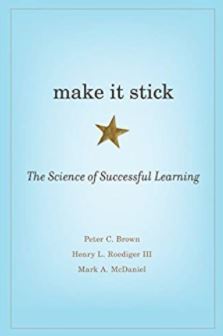‘Mass practice’ in which you spend one session trying to learn everything is not as effective for long-term recall than ‘spaced out practice’. Mass practice could help with an imminent exam. Spaced out practice feels like your brain needs to work harder but this process assists with longer term recall.
Tests are helpful, particularly if low pressure, more revision making your brain work harder assist you to recall things. The feedback and reviewing how you did on regular tests help.
Conceptual knowledge requires an understanding of the interrelationships of the basic elements within a larger structure, this enables knowledge to function together.
When learning be sure to mix up learning so not just repetition of one problem then the next type of problem. By mixing up your learning it facilitates recall when later knowledge is required in a more ad hoc fashion. Space out learning and vary the pattern when tested on recall to make your brain work harder to recall this.
Suggests disrupting materials, by omitting letters so your brain has to work harder to think. Vary the order in lecture compared to the order of a book so makes people think more when retrieving this.
Encoding of information is held in short term working memory before being consolidated into a cohesive representation of knowledge in long term memory. Consolidation reorganizes and stabilizes memory traces, gives them meaning, and makes connections to past experiences and to other knowledge which is already stored in the long term memory. Retrieval updates learning and enables you to apply it when you need it. Learning always builds on a store of prior knowledge.
We interpret and remember events by building connections to what we already know, therefore we’re all hardwired to make errors in judgment. Good judgment is a skill one must acquire and to do this we must first becoming an astute observer of one’s own thinking. Be aware one’s own thinking is misled by illusions, cognitive biases, and the stories we construct to explain the world around us and our place within it. We must learn to become more accurate judges of what we ourselves know and don’t know, adopt learning strategies that get results, and find objective ways to track our progress.



